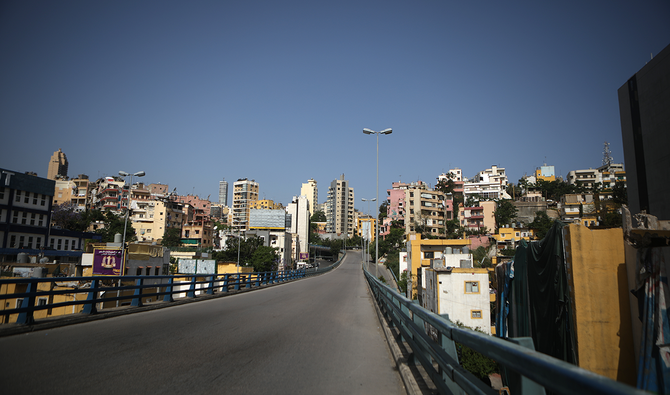BEIRUT: Lebanon is imposing a two-week coronavirus lockdown starting July 30, the country’s health minister said, as he slammed the “lack of community discipline and disregard” for all preventive measures and warned that the outbreak was taking a “dangerous turn.”
The number of confirmed cases on Monday reached 135 and Saturday’s cases were the highest since February at 175.
“The number is very large and indicates the seriousness of this stage,” said Health Minister Hamad Hassan, following a meeting of a COVID-19 ministerial committee headed by Prime Minister Hassan Diab.
He added that what was happening was another indication of the “rapid spread” of the virus within one week. “The infected person is now spreading the infection to 3 people.”
The total lockdown of the country is from July 30 to August 3 and from August 6 until August 10, including the days of Eid Al-Adha. It is a measure intended to relieve pressure on hospitals that have started to get overcrowded. However, the final decision will be taken by the Council of Ministers that will meet Tuesday.
Hassan warned that the community outbreak of the disease was beginning to take a “dangerous turn” and he regretted “the lack of community discipline and disregard for all preventive measures imposed on people.”
Fears of COVID-19 have overtaken the country’s many financial and economic concerns, with politicians, parliament officials, ministry and court staff taking polymerase chain reaction (PCR) tests on Monday and entire towns shutting down.
Although the ministerial committee did not recommend closing Beirut International Airport, it decided that nobody would be allowed into Lebanon from the start of August without a negative PCR test from the departure country.
"Passengers will have to stay in quarantine for two days at their own expense in special centers, pending the results of the second PCR test at the airport,” Hassan said. “Those who have the logistical capacity for quarantine will not have to go to these centers.”
Hassan requested hospitals to postpone receiving cold medical cases to later appointments because there were 222 cases within the health sector among doctors, nurses and employees. He called on hospitals to “completely prevent visits to patients or make them minimal.”
Lawyers in the Bar Association had to take PCR tests after one of their number was found to have the disease. Employees and judges at the Palace of Justice in Beirut were tested and it was decided to suspend trial sessions for four days.
Fear of contracting the virus has also reached politicians. The minister of defense, Zeina Aker, announced that her daughter had been infected with the virus. Parliament closed on Monday to carry out PCR tests for MPs who had mixed with George Aqis, including Speaker Nabih Berri. Aqis’ first test was positive but the second was negative.
The need for hundreds of Syrian workers to take PCR tests before entering Syrian territory has led to overcrowding in Lebanese government hospitals, with long lines of people waiting to be seen at authorized laboratories for testing.
“There was great pressure on the 50 laboratories,” Hassan said. “The number of tests increased to between seven and eight thousand daily, which caused a delay in announcing the results and affected the control of positive cases.”
Seventeen members of the Lebanese Red Cross contracted the virus from an infected volunteer who had moved one of his relatives to hospital. The relative suffered from burns at home and it was found out that he had COVID-19.
























